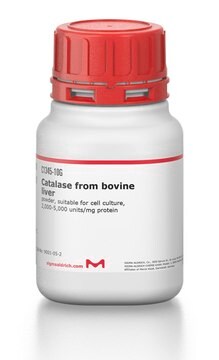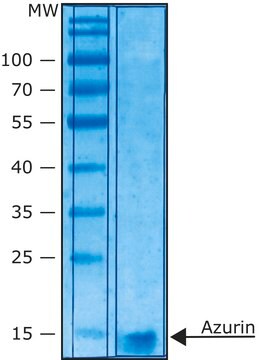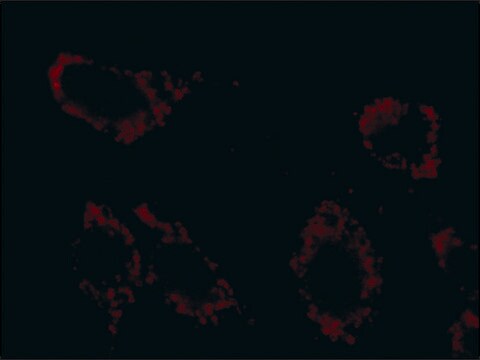生物源
bovine
品質等級
重組細胞
expressed in E. coli
化驗
≥90% (SDS-PAGE)
形狀
lyophilized powder
比活性
≥2500 units/mg protein
儲存條件
(Tightly closed)
技術
inhibition assay: suitable
顏色
white
最適pH
7.8 (25 °C)
pH值範圍
7.6-10.5
pI
4.95
序列說明
MATKAVCVLKGDGPVQGTIHFEAKGDTVVVTGSITGLTEGDHGFHVHQFGDNTQGCTSAGPHFNPLSKKHGGPKDEERHVGDLGNVTADKNGVAIVDIVDPLISLSGEYSIIGRTMVVHEKPDDLGRGGNEESTKTGNAGSRLACGVIGIAK
UniProt登錄號
儲存溫度
−20°C
一般說明
研究领域:细胞信号传导
来自牛红血球的SOD是在哺乳动物组织中发现的第一种SOD。根据活性位点中金属离子不同SOD有三种形式。它们是Cu+2/Zn+2、Mn+2和Fe+2 SOD。在脊椎动物中,Cu/Zn-SOD位于细胞质和叶绿体,也可位于细胞外间隙,而 Mn-SOD则位于线粒体基质和过氧物酶体。Fe-SOD广泛存在于原核生物的叶绿体和一些高等植物中。
来自牛红血球的SOD是在哺乳动物组织中发现的第一种SOD。根据活性位点中金属离子不同SOD有三种形式。它们是Cu+2/Zn+2、Mn+2和Fe+2 SOD。在脊椎动物中,Cu/Zn-SOD位于细胞质和叶绿体,也可位于细胞外间隙,而 Mn-SOD则位于线粒体基质和过氧物酶体。Fe-SOD广泛存在于原核生物的叶绿体和一些高等植物中。
應用
超氧化物歧化酶已被用于:
- 构建用于评估超氧化物歧化酶活性的校准曲线
- 用于研究可能影响 L-精氨酸-一氧化氮途径的脂蛋白
- 用于研究人 Cu、Zn 超氧化物歧化酶中碳酸根-阴离子-自由基诱导的色氨酸转换后修饰为犬尿氨酸的质谱证据
生化/生理作用
超氧化物歧化酶(SOD)催化超氧化物自由基的歧化反应生成过氧化氢和分子氧。该反应相应地激活氧化还原敏感性激酶,并使特定磷酸酶失活,以调节氧化还原敏感性信号通路,包括肥大、增殖和迁移。SOD是一种强效抗氧化剂,保护细胞免于氧自由基的毒性作用。SOD也可通过与一氧化氮(NO)竞争超氧化物阴离子(其与NO反应生成凋亡诱导剂亚硝酸盐)来抑制细胞凋亡。
單位定義
在 25°C、pH 7.8 的黄嘌呤氧化酶偶联系统中,1 个单位将抑制细胞色素 c 减少 50%(反应体积 3.0 mL)。黄嘌呤氧化酶浓度应产生初始 ΔA550 为 0.025±0.005/min。
準備報告
采用无动物成分材料生产。
重構
用 10 mM 磷酸钾(pH 7.4)复溶。
分析報告
消光系数:EmM = 10.3 (258 nM)
由于不存在色氨酸,SOD 在 280 nM 处无明显的吸收峰。
由于不存在色氨酸,SOD 在 280 nM 处无明显的吸收峰。
其他說明
抑制剂: 氰化物,OH -(竞争性),过氧化氢
抗體
訊號詞
Danger
危險聲明
危險分類
Resp. Sens. 1
儲存類別代碼
10 - Combustible liquids
水污染物質分類(WGK)
WGK 1
閃點(°F)
Not applicable
閃點(°C)
Not applicable
其他客户在看
Hao Zhang et al.
Free radical biology & medicine, 36(11), 1355-1365 (2004-05-12)
In this review, we describe the free radical mechanism of covalent aggregation of human copper, zinc superoxide dismutase (hSOD1). Bicarbonate anion (HCO3-) enhances the covalent aggregation of hSOD1 mediated by the SOD1 peroxidase-dependent formation of carbonate radical anion (CO3*-), a
L Vergnani et al.
Circulation, 101(11), 1261-1266 (2000-03-22)
Native and oxidized LDLs (n-LDL and ox-LDL) are involved in the atherogenic process and affect endothelium-dependent vascular tone through their interaction with nitric oxide (NO). In this study we evaluated directly, by using a porphyrinic microsensor, the effect of increasing
Tohru Fukai et al.
Cardiovascular research, 55(2), 239-249 (2002-07-19)
Excessive production and/or inadequate removal of reactive oxygen species, especially superoxide anion (O(2)(*-)), have been implicated in the pathogenesis of many cardiovascular diseases, including atherosclerosis, hypertension, diabetes, and in endothelial dysfunction by decreasing nitric oxide (NO) bioactivity. Since the vascular
Laura Micheli et al.
Scientific reports, 8(1), 14364-14364 (2018-09-27)
Oxaliplatin treatment is associated with the development of a dose-limiting painful neuropathy impairing patient's quality of life. Since oxidative unbalance is a relevant mechanism of oxaliplatin neurotoxicity, we assessed the potential antioxidant properties of Vitis vinifera extract in reducing oxaliplatin-induced
Susanne Flor et al.
Antioxidants (Basel, Switzerland), 10(12) (2021-12-25)
Glioblastoma remains the deadliest form of brain cancer, largely because these tumors become resistant to standard of care treatment with radiation and chemotherapy. Intracellular production of reactive oxygen species (ROS) is necessary for chemo- and radiotherapy-induced cytotoxicity. Here, we assessed
商品
Oxidative stress is mediated, in part, by reactive oxygen species produced by multiple cellular processes and controlled by cellular antioxidant mechanisms such as enzymatic scavengers or antioxidant modulators. Free radicals, such as reactive oxygen species, cause cellular damage via cellular.
我们的科学家团队拥有各种研究领域经验,包括生命科学、材料科学、化学合成、色谱、分析及许多其他领域.
联系技术服务部门



